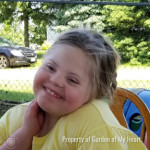I read that you are seeking information from the community about the proposed law enforcement training program you plan to help implement. As mother to a child with Down syndrome, I would like to share my thoughts.
It seems your support of a training program is a foregone conclusion. Since you feel you must support such a program, I urge you to consider the following as you move forward.
Consider the precedent this kind of training sets should law enforcement officers harm or kill a person with Down syndrome in the future. If the officer involved has not yet received this special “Down syndrome training,” will he or she be able to use that in their defense? Will the three men responsible for Mr. Saylor’s death be able to use that in their defense? When writing this training, please be clear how, exactly, lack of specialized training led to Mr. Saylor’s death. And please be clear that lack of this kind of training is not an excuse for poor decision making.
Consider the precedent this kind of training sets by establishing a false standard for Down syndrome. There is no one set of diagnoses or behaviors that defines a person with Down syndrome. Individuals with Down syndrome share one thing, and one thing only: a third 21st chromosome. Outside of that, they are as unique as you or me. As an example, for each person with Down syndrome who does not mind being touched, there is another who reacts negatively. What will the training teach – to touch or not touch? This could make a significant difference during interactions with law enforcement. Examples like this are many – too many to craft an effective plan for working with all people with Down syndrome.
Training to a false standard of Down syndrome only creates further confusion for those working with this population. A person with Down syndrome will react as an individual, based on his or her individual needs and on the unique situation. No amount of specialized training can teach law enforcement what they should already know: treat people with respect, keep calm, read the situation carefully, and do not escalate unless all other options have been exhausted and the person is an immediate threat to himself or others.
Consider what this kind of training says about the Down syndrome community at large. It furthers the belief that community members require highly specialized training to work with individuals with Down syndrome – an argument often used to deny individuals access to jobs, schools, and other community resources. Just this month a teenager with Down syndrome was denied a gym membership because the gym has no “qualified” staff. This concern is real and immediate. What will the training teach that being a reasonable, kind human being cannot? People with Down syndrome require dignity, respect, and perhaps a little extra time or a little extra support. No one needs special training to work with them, spend time with them, or, in the case of law enforcement, to protect them.
I urge you to please consider these three points as you develop training for law enforcement. Please do not let this become a step backward for the Down syndrome community’s push for independence, dignity, and respect.







5 Responses to Open Letter to NDSS and NDSC